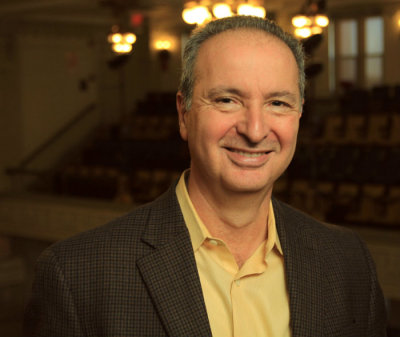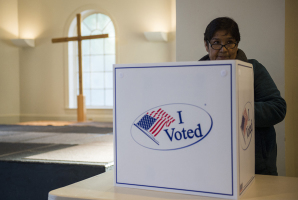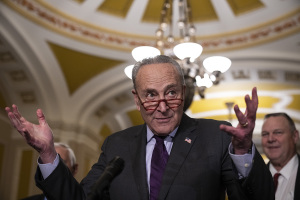Racial Reconciliation Can Only Happen If Christians Are Willing to Do These Three Things
On the greatest concern for me, I have to break it into two areas. One, I immediately, with the things that have been going on in the context (or racial landscape) with the killing of black men and black boys, I personally go to my three nephews. I immediately — when it happened in Baltimore, what happened in Ferguson, I think of my nephew in Texas, so I called. I want to be in contact, I want to talk to him, I want to talk to all three of them, I want to protect them, I want to move them, all of those things. That's a great concern for me.
Then, the silent and irrelevant church that I see. Particularly, let me talk about where I'm at in the city of Philadelphia. That is a great concern to me. Because we're losing young people, (who are) moving away and out and (are) lost and disillusioned because of a silent church, so that concerns me.
Small: Where do you think Christians need to provide stronger leadership?
McNeil: [...] We have to risk breaking our silence and letting people who know us become angry with us because we take the risk to speak up.
I think the church has to take stronger leadership in naming our fear. I've begun to find that Christians do things that are hateful, not because they're mean or racist or hate-filled. I believe that at the core there's a fear. The fear of our country is going into a direction that we don't like. A fear that we might lose resources. A fear that the good old days are gone and we're scared of this generation that's coming.
I get it, I understand it. I, too, see changes happening. But I think the church needs to have a healthy discussion about what it is we fear because I think at the bottom of our inactivity, or the things that we do that tend to be racist in nature are often motivated by fear and not by hate.

Scazzero: I have a great burden for the church, to be mobilizing the church into all arenas. But I think the church — I can speak for white Christians at this point. I think it's very important to deal with issues of power and being willing to surrender power to nonwhites and submit to nonwhites. I think it's a critical juncture. I think steadfastness and staying with it over the long haul is critical. … That to me is critical, pastors and leaders who want to give their whole lives, I'm talking about their entire lives, to seeing this change in our generation. I think that's critical for long-term impact (bridging racial, economic, and gender barriers).
Small: What would be the most strategic next step that you would encourage leaders to take to impact their cities regarding this topic of racial reconciliation?
Scazzero: I always begin theologically. I think just the fact of Jesus and reconciliation are just ... reconciliation is a natural outwork of following Jesus. So I think my strategic next step would be getting, equipping key people who understand you're gonna suffer and you're gonna go slow and (to say) 'I'm in it.' It's been mentioned already, a theological paradigm that's got to go with it without whatever I'm going to deal with myself in terms of grieving, lamenting. …
I joke around often: you want this white person to grieve what it's like to be African-American in the United States, but they don't even feel their own losses. So they're so unaware themselves of their own inner life, their own spouses or families they don't know how to love them, so how the heck are they gonna love across cultures and across class divides?
Back to the superficiality of the way we do formation, unless that changes, it's (not) going to be real reconciliation in our churches. That to me is ... getting out of the American Christianity (which) is basically above the surface. It's, for me, it's program -driven, it's numbers-driven. That has to end to (see) some significant formation in Jesus in our lives that's beyond what most American churches do. That to me must change, if there's going to be reconciliation. Apart from it, it's hard for me to see long-term change.
Jones: I am a visual learner in this and sometimes I see pictures of walking around with a big sign saying to churches "put down your agendas." It's a prophetic statement of "Put down your agendas. Pick up the cause of restoration." I was brought up on two scriptures in the '70s, and that was Luke 4:18 and 19 and Isaiah 58. And I have this, again, vision of us becoming the ones who rebuild the ancient ruins and raise up the age-old foundations and be called the repairers of the breach.
How do you do that? You have to first "put down your agenda." If you don't put down your agendas you cannot pick up the cause of restoration for this country, for your people, for your community or for your church. That to me is the first step that has to be taken.
The next one is get past the paralysis of dialogue and really begin developing strategic relationships and collaborations and networking that meet the need of the restoration of the community that you're working in. That, of course, I'm passionate about.
McNeil: I think the church has been guilty of being reactive lately, so it almost seems as if the train leaves the station and at some point we kind of wake up and kind of go, "Oh my." But by now, corporate America has already begun to do the diversity work. Our government officials and other people have begun to say this is a priority. Then it seems that we're a little slow to come to the party.
I would agree 100 percent that we need to build collaborations and partnerships and be proactive about doing it, because our survival, I think, depends on us partnering … not just (churches coming together across denominational lines to hold joint worship services). Those are nice, but those are not the kinds of strategic partnerships and collaborations that really are necessary right now.
What we need is, I think, people who see things happening in their city that everybody has an investment in seeing improved, and churches say we're gonna partner together against racial, ethnic, socio-economic lines to address this. It's gonna take a long time, and we're gonna have to see how this is mutually beneficial for all of us. It's gonna mean that we'll have to learn together and compromise with each other.
I said once and I still do believe, that the day of the single (unintelligible) are over. I believe that whatever God is doing in this next season of the church has to do with collaborative partnerships where people are working together over an extended period of time for a mutually beneficial goal. That will cross racial and ethnic barriers. I'm learning to speak Spanish, and I see something happening to black churches. So it's not a black-white thing anymore.
There are Latino communities growing up around where black churches used to be and many of us don't speak another language. We're gonna have to learn to do that if we're going to lead in this diverse, global society that's growing up around us.




























